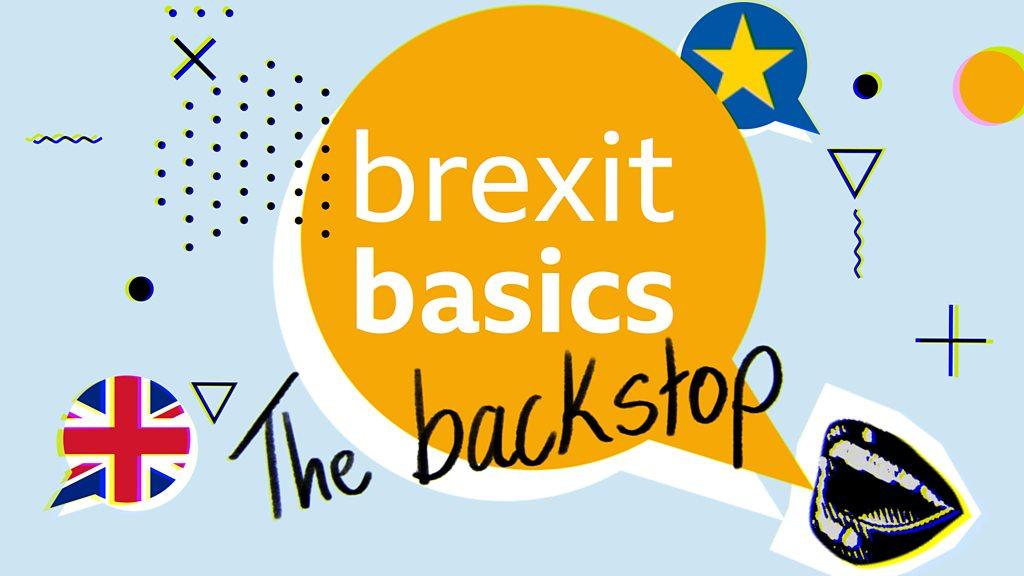Reality Check: Theresa May's Brexit letter
- Published
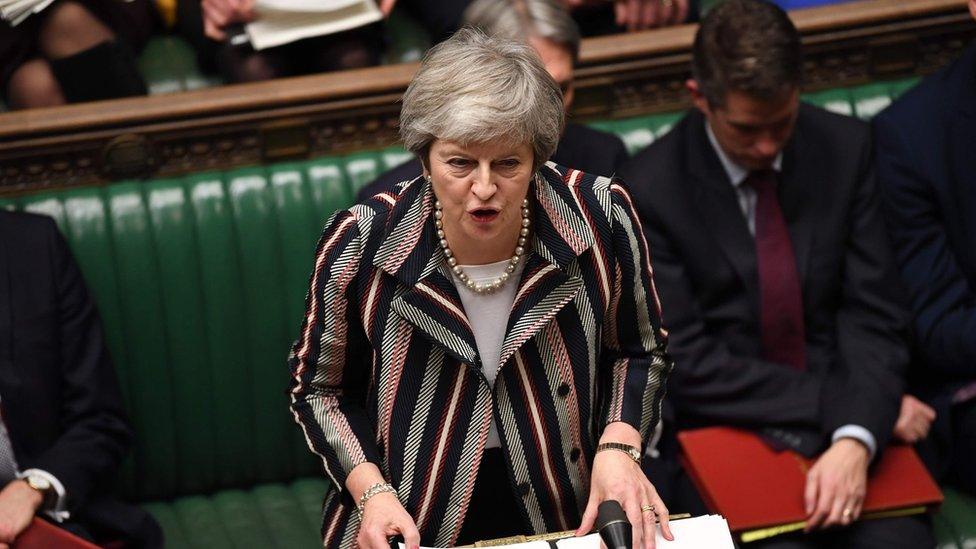
The prime minister has reported back to the House of Commons on the outcome of the EU's Brexit summit in Brussels and urged MPs to vote in favour of the "best and only" available deal.
Many of her arguments echoed those in a "letter to the nation", external released by Downing Street over the weekend.
BBC Reality Check has pulled out some of the key lines in the letter.
Immigration
Theresa May: "We will take back control of our borders, by putting an end to the free movement of people once and for all."
Reality Check analysis: Yes, in the long term, free movement of people will come to an end - but it will continue during the transition (or implementation) period after Brexit, which is currently due to end on 31 December 2020 but could be extended by "one or two years".
After that, when the UK leaves the EU single market, the requirement to allow the free movement of people from the EU will no longer apply and the UK will be free to set its own immigration policy.
It also means, of course, that free movement in the other direction, for UK citizens travelling to the EU, will come to an end, although both sides have pledged to avoid the imposition of visas for short-term visits, such as holidays.
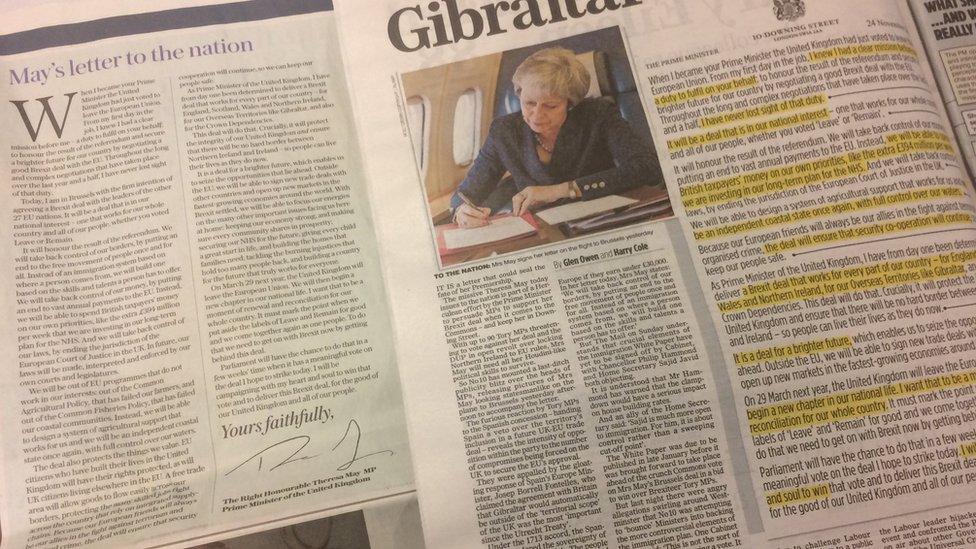
Money
Theresa May: "We will take back control of our money, by putting an end to vast annual payments to the EU.
"Instead, we will be able to spend British taxpayers' money on our own priorities, like the extra £394m per week that we are investing in our long-term plan for the NHS."
Reality Check analysis: Annual payments into the EU budget will continue to be calculated in the same way during the transition period, until 31 December 2020. After that, if transition is extended, substantial payments to the EU budget will still have to be made but they will be calculated separately.
There will also be additional payments as part of the financial settlement (or divorce bill) that the UK has agreed with the EU in its withdrawal agreement - but after a few years, they will be reduced fairly rapidly. The Office for Budget Responsibility has forecast, for example, that the divorce bill payment in 2022-23 will be £7.9bn, which is £5.6bn less than it forecasts the UK would pay if it remained in the EU.
Some budget payments will still have to be made to cover the EU programmes the UK would like to remain part of. And none of this takes account of the potential impact on the economy of leaving the EU. The vast majority of economists expect the UK economy to be smaller in the first few years after Brexit than it would have been if the UK had stayed in the EU.
Government analysis, comparing the economic impact of the prime minister's deal, no deal and staying in the EU, is expected to be released in the coming days.
As for £394m a week to spend on the NHS, that money has come from a government decision to devote more tax receipts to health spending. It should not be confused with a similar number, £350m a week, that was written on the side of the Vote Leave bus.
Confused by Brexit jargon? Reality Check unpacks the basics
Laws
Theresa May: "We will take back control of our laws, by ending the jurisdiction of the European Court of Justice in the UK.
"In future, our laws will be made, interpreted and enforced by our own courts and legislatures."
Reality Check analysis: Yes, the direct jurisdiction of the European Court of Justice will eventually come to an end in the UK.
It will continue to apply in full during the transition period. And then for eight years after that, the ECJ will have a role with regards to the rights of EU citizens in the UK.
If there is any dispute about what the withdrawal agreement says about citizens' rights during that period, the ECJ will decide on matters of EU law. But in practice, that is likely to involve no more than a handful of cases.
In terms of a dispute resolution mechanism between the UK and the EU in the future, a joint committee of officials from both sides will be set up - and if they can't agree, it can go to independent arbitration.
On any matters of EU law though, and there will be a lot of EU law entwined in the future relationship, the ECJ will have a final binding say.
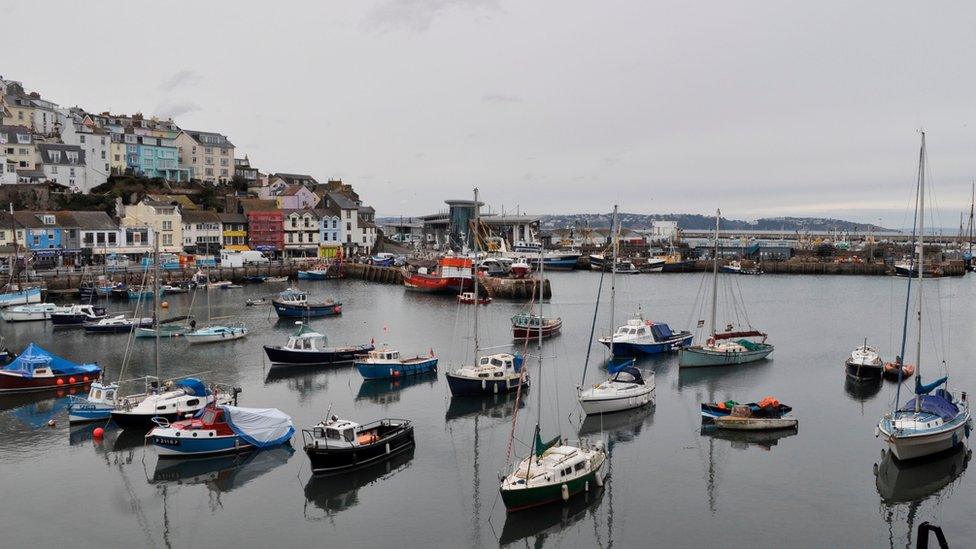
Farming and fishing
Theresa May: "We will be out of EU programmes that do not work in our interests: out of the Common Agricultural Policy that has failed our farmers and out of the Common Fisheries Policy that has failed our coastal communities.
Reality Check analysis: Countries with a very close relationship with the EU, such as Norway, can choose to be outside the CAP and the CFP - and the UK will be no different, once the post-Brexit transition period is over.
But we saw during the EU's Brexit summit in Brussels that independence can have consequences. The French President, Emmanuel Macron, was one of several EU leaders who warned that future negotiations on fishing would be extremely tough.
The UK sells nearly £1bn of fish produce to the EU every year - and a number of EU countries are insisting that tariff-free trade of that kind can continue only if EU fishing boats continue to get access to UK waters.
Confused by Brexit jargon? Reality Check unpacks the basics
Citizens' rights
Theresa May: "EU citizens who have built their lives in the United Kingdom will have their rights protected, as will UK citizens living elsewhere in the EU."
Reality Check analysis: Under the withdrawal agreement, EU citizens in the UK and UK citizens in the EU will retain their residency and social security rights after Brexit. Citizens who take up residency in another EU country during the transition period (including the UK, of course) will be allowed to stay in that country after transition. And anyone staying in the same EU country for five years will be allowed to apply for permanent residence.
But many UK citizens living on the continent (and there are at least one million of them) feel that their rights aren't being protected. Particularly those whose jobs rely on selling services - as architects, or chefs, or lorry drivers, or lawyers - across borders. They don't work in one country alone. But the withdrawal treaty does not guarantee that they will be able to continue working in the same way after Brexit - what are known as 'mobility issues' will only be negotiated as part of the future relationship.
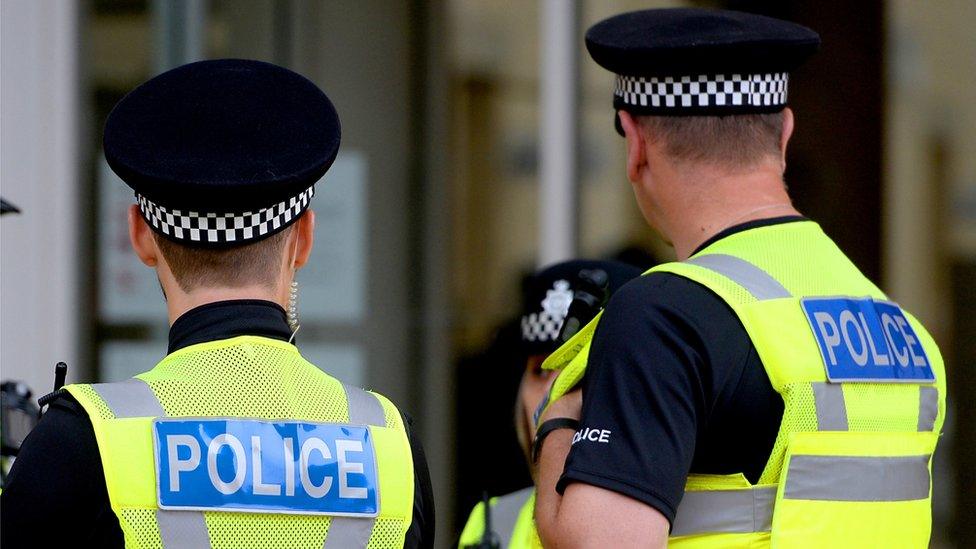
Security
Theresa May: "Because our European friends will always be our allies in the fight against terrorism and organised crime, the deal will ensure that security co-operation will continue, so we can keep our people safe."
Reality Check analysis: Both sides obviously want extremely close security co-operation to continue but there are still some legal and technical hurdles to overcome.
There are some security databases, the EU insists, that can be accessed in real-time by only EU member states.
The political declaration on the future EU-UK relationship says access to several databases will "approximate" the capabilities shared with full member states, rather than replicate them.
The declaration also suggests the EU will offer the UK "operational co-operation" rather than full membership of the EU police agency Europol and the judicial co-operation agency Eurojust.
Confused by Brexit jargon? Reality Check unpacks the basics
Irish border
Theresa May: "Crucially, it will protect the integrity of our United Kingdom and ensure that there will be no hard border between Northern Ireland and Ireland - so people can live their lives as they do now."
Reality Check analysis: The withdrawal agreement does ensure that there will be no hard border between Northern Ireland and Ireland, but only because it includes the option of using the backstop plan that has proved so unpopular among many Tory Brexiteers and the DUP.
It is worth emphasising that neither side actually wants the backstop to come into effect - it raises a series of awkward questions for the EU too.
But the fact that the backstop includes the provision for a temporary customs union for the whole of the UK, an arrangement that the UK cannot leave unilaterally, will continue to be controversial.
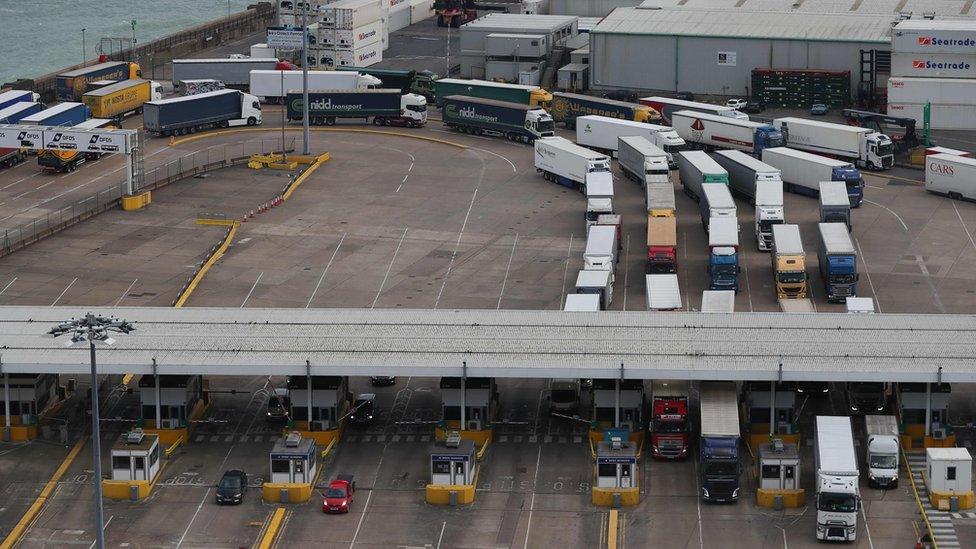
Trade
Theresa May: "Outside the EU, we will be able to sign new trade deals with other countries and open up new markets in the fastest-growing economies around the world."
Reality Check analysis: As long as the UK is in a transition period, or if the backstop has to come into effect, the UK will not be able to implement its own trade deals on goods (deals that remove or cut tariffs) with other countries.
The withdrawal agreement and the political declaration commit both sides to use their "best endeavours" to agree a comprehensive future free trade deal that will solve the Irish border problem.
But the EU continues to insist the only way to keep the border as open as it is now is to have completely frictionless trade and it argues that that can be done only by staying in the customs union and the single market.
The government disagrees but this basic argument has been postponed not resolved.


- Published23 December 2020
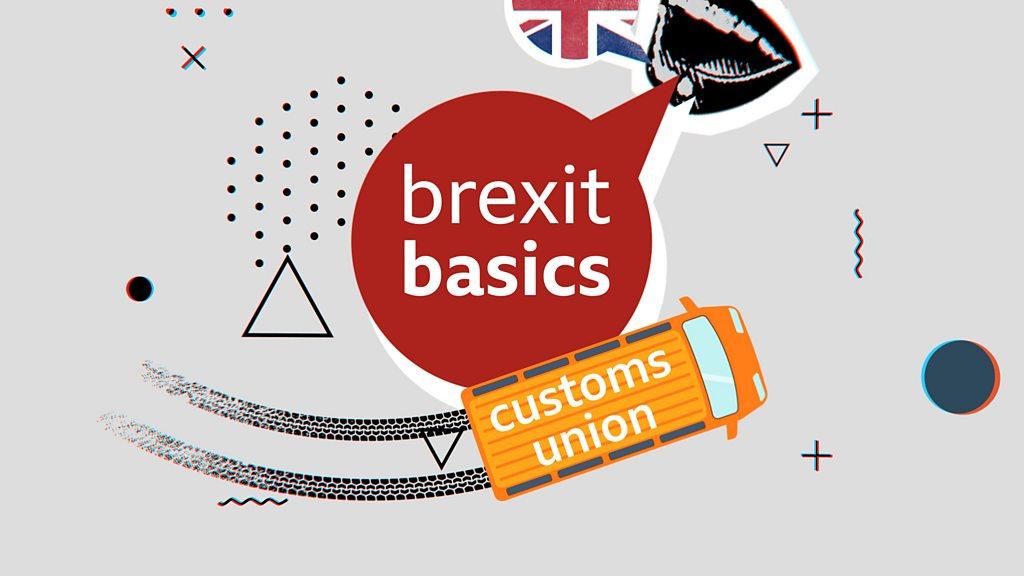
- Published3 February 2020
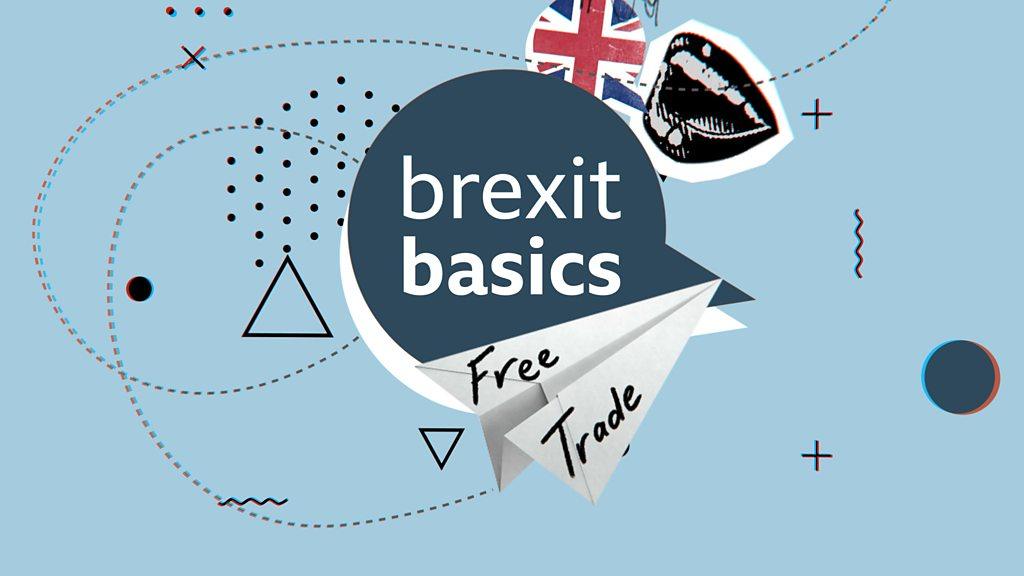
- Published1 February 2020
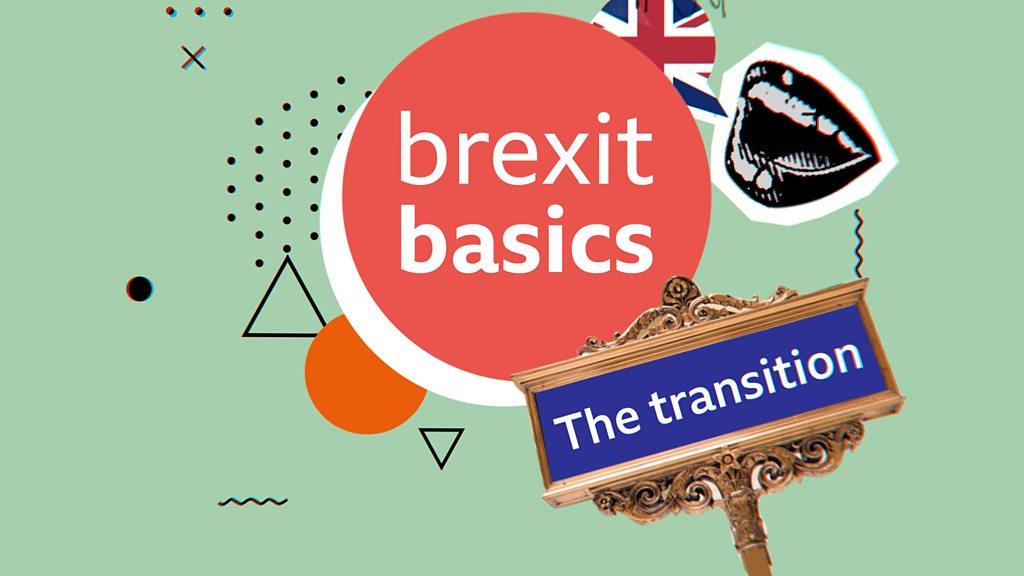
- Published13 September 2019
